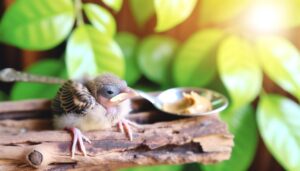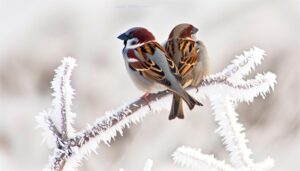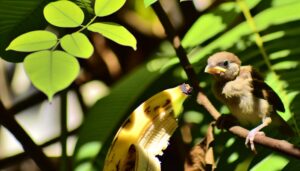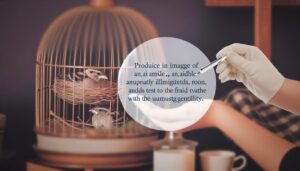How to Safely Feed Baby Sparrows Roly Polies
Yes, you can feed a baby sparrow roly-polies. They're rich in protein, essential for tissue and muscle development.
Roly-polies also provide crucial vitamins and minerals, including calcium and iron, which support bone health and oxygen transport. As they are highly digestible, baby sparrows can efficiently absorb nutrients, promoting rapid growth and feather development.
Always make sure fresh water is available and consider a varied diet with other insects like mealworms to provide a balanced nutritional profile. If you want to learn more about safe insect choices and nutritional needs, there's detailed information ahead.
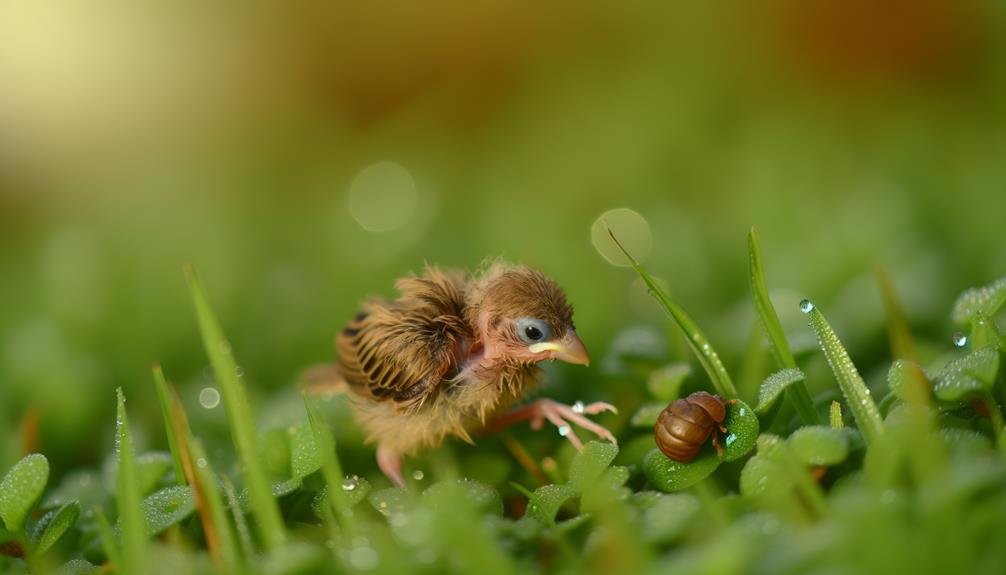
Key Takeaways
- Roly-polies provide 20% protein by dry weight, supporting tissue development.
- They are rich in essential amino acids for efficient absorption.
- Roly-polies offer vitamins and minerals, including calcium for bone formation.
- They contain iron, magnesium, and zinc for overall health and muscle function.
- Roly-polies are a safe, digestible protein source for baby sparrows.
Baby Sparrow Diet Basics

A baby sparrow's diet fundamentally consists of protein-rich foods that mimic what they'd naturally consume in the wild. You'll need to focus on providing a variety of insects, such as mealworms, which are essential for their growth and development.
High-protein diets guarantee the rapid growth of their feathers and muscles. You should also consider small caterpillars and aphids, as these are commonly found in their natural habitat.
Avoid offering human food or seeds at this stage, as their digestive systems aren't equipped to handle such items yet.
Nutritional Needs
You'll need to make sure the baby sparrow receives essential dietary components, including proteins and minerals important for growth.
Protein sources like insects are essential for muscle development, while minerals such as calcium contribute to bone strength.
Essential Dietary Components
Understanding the nutritional needs of a baby sparrow is significant to guarantee its optimal growth and development. You need to provide a well-rounded diet to secure it gets the essential nutrients. Here's a detailed breakdown:
- Protein: Important for tissue development and overall growth. Secure sources are easily digestible.
- Fats: Necessary for energy and healthy feather development. Opt for sources rich in omega-3 and omega-6 fatty acids.
- Vitamins: Essential for metabolic processes. Include vitamins A, D, E, and B-complex in the diet.
- Water: Essential for hydration and metabolic functions. Secure fresh, clean water is always available.
Protein and Mineral Sources
Protein sources like insects and mealworms are vital for a baby sparrow's muscle development, while minerals such as calcium and phosphorus support bone growth and overall structural integrity.
To meet these needs, you should provide a varied diet that includes high-protein insects and fortified supplements. Mealworms are particularly beneficial because they offer a balanced protein-to-fat ratio.
Additionally, calcium is essential for preventing deformities and ensuring proper skeletal formation. Phosphorus works in conjunction with calcium to strengthen bones and aid in metabolic processes.
You can also include cuttlebone or crushed eggshells in their diet to boost calcium intake. By ensuring these nutritional components, you'll foster healthy growth and development in baby sparrows, setting a strong foundation for their future well-being.
Safe Insect Choices
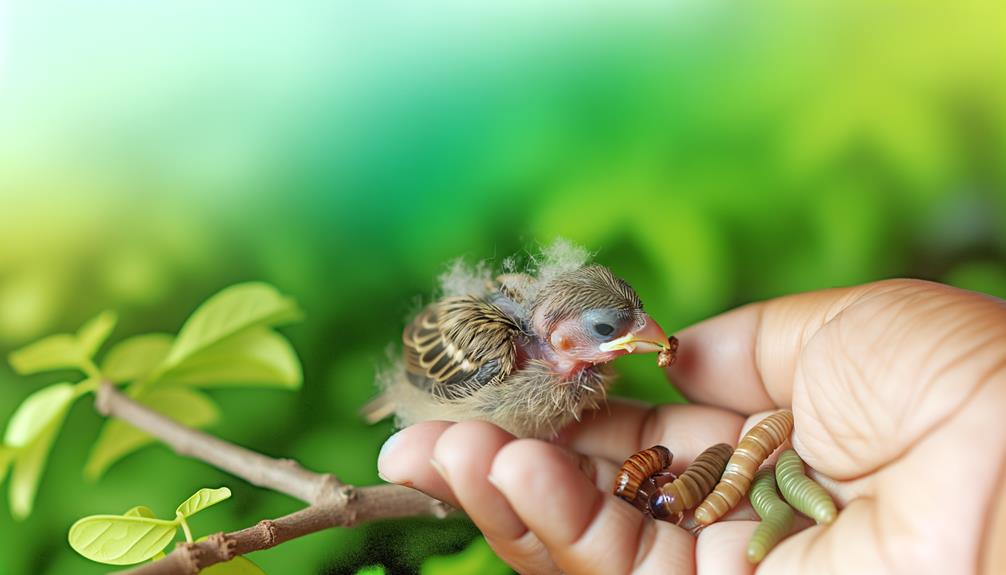
When choosing safe insect options for a baby sparrow, it's important to consider both nutritional value and potential toxicity. Guaranteeing the insects are free from pesticides and parasites is vital.
Consider these choices:
- Mealworms: High in protein and easy to digest, providing essential amino acids for growth.
- Crickets: Nutrient-rich, offering a balanced profile of proteins, fats, and minerals.
- Flies: Excellent for providing immediate energy through fats and carbohydrates.
- Waxworms: High in fat, they should be offered sparingly to prevent obesity but are great for energy.
Carefully selecting these insects ensures the baby sparrow receives a balanced diet while minimizing risks of illness or nutritional deficiencies.
Always choose live or freshly killed insects rather than dried ones.
Roly-Poly Nutritional Value
When feeding a baby sparrow roly-polies, you need to understand their nutritional value.
Roly-polies offer a rich protein content, essential for the bird's growth and development.
Additionally, they provide a balanced vitamin and mineral profile, contributing to the overall health of the baby sparrow.
Protein Content Analysis
Roly-polies, also known as pill bugs, offer a surprisingly strong protein content that can greatly benefit the dietary needs of a growing baby sparrow. Their protein levels play a vital role in muscle development and overall growth.
When analyzing the protein content in roly-polies, consider the following factors:
- Protein Concentration: Roly-polies contain approximately 20% protein by dry weight, making them a substantial protein source.
- Amino Acid Profile: They provide a balanced array of essential amino acids necessary for the sparrow's development.
- Digestibility: The protein in roly-polies is highly digestible, ensuring efficient nutrient absorption.
- Bioavailability: The proteins are readily available for use in the sparrow's metabolic processes, supporting rapid growth and development.
Incorporating roly-polies into the baby sparrow's diet can greatly enhance its nutritional intake.
Vitamin and Mineral Profile
In addition to their protein content, roly-polies are rich in essential vitamins and minerals that contribute greatly to a baby sparrow's overall health and development. These small crustaceans are a good source of calcium, which aids in bone formation and feather growth. They also contain iron, essential for oxygen transport in the blood, and magnesium, which supports muscle function and metabolic processes.
Zinc in roly-polies helps with immune function and wound healing. Additionally, phosphorus works alongside calcium for skeletal health. By incorporating roly-polies into a baby sparrow's diet, you're ensuring they receive a balanced intake of these important nutrients, promoting robust growth and a stronger immune system.
Careful dietary choices can have a significant impact on their survival and thriving.
Feeding Techniques
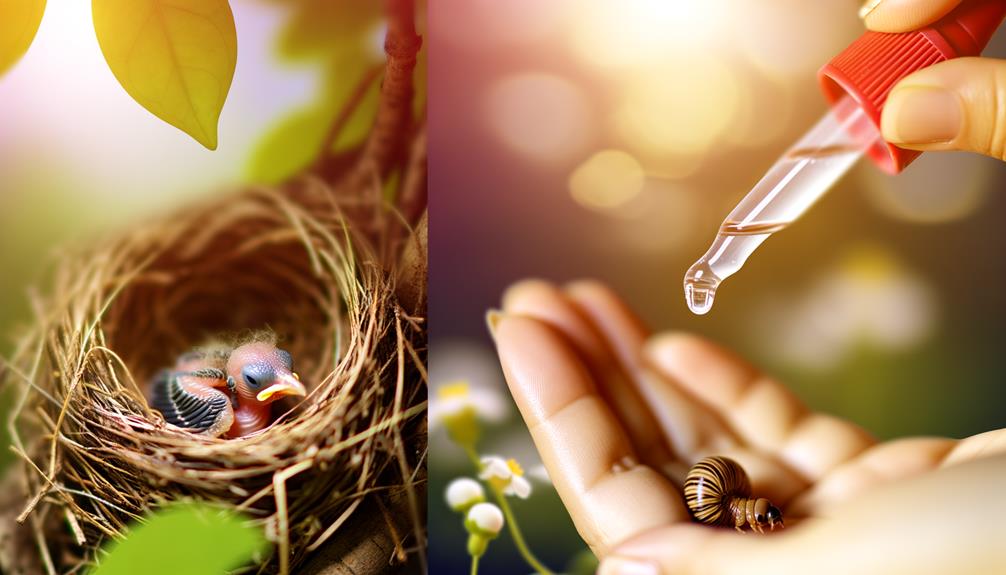
To effectively feed a baby sparrow roly-polies, make certain you use a pair of tweezers to carefully place the insect directly into the bird's open beak, mimicking the natural feeding behavior it would experience in the wild. This method guarantees the sparrow receives adequate nutrition and prevents injury.
Consider the following steps:
- Preparation: Gently crush the roly-poly to make it easier to swallow.
- Timing: Feed the sparrow every 15-20 minutes during daylight hours.
- Positioning: Hold the sparrow upright to prevent choking and aspiration.
- Observation: Monitor the sparrow's reaction to make sure it's swallowing and digesting properly.
Using these techniques, you'll foster the bird's growth and wellbeing efficiently and safely.
Alternatives to Roly-Polies
When roly-polies aren't available, you can provide baby sparrows with alternative sources of protein and nutrients to guarantee they thrive.
Mealworms are an excellent option, rich in protein and easy to digest.
Another substitute is crickets, which offer essential amino acids.
You can also consider offering finely chopped hard-boiled eggs; they supply essential proteins and fats.
For additional nutrients, incorporate small amounts of mashed fruits like apples or bananas.
Make sure all food is cut into tiny, manageable pieces to prevent choking.
Hydration is important, so moisten dry food with water.
Conclusion
Feeding a baby sparrow is like being a master chef crafting a delicate dish. You need to balance the ingredients carefully—protein-rich insects, like roly-polies, are the spices.
Yet, sparrows thrive on a varied diet, much like a garden flourishes with diverse plants. While roly-polies offer nutrition, they're just one ingredient. Use them sparingly and explore other safe insects.
Ensuring a balanced diet will help your baby sparrow grow strong, just as a well-tended garden blooms beautifully.

